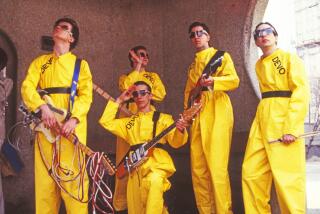Stereolab Transplants Organ Sounds to the ‘70s
- Share via
It might not be something the folks from Guinness would care about, but the English/French band Stereolab appears to be a legitimate contender for a very obscure world record: most members of a rock band credited with playing the Vox organ--a ‘60s garage-rock staple--on the same album.
The total, in Stereolab’s case, is four, achieved in 1993 on the band’s first major-label release, “Transient Random Noise-Bursts With Announcements.”
“That roughed-up organ, put through an amp and distorted--I don’t know why, but I’m always attracted to that kind of sound,” says Tim Gane, the co-founder of the group, which plays tonight at the Glass House in Pomona and Sunday and Monday at the Troubadour. “I don’t like things too clean. I like a bit of spillage.”
But though Gane says that Stereolab has “five organs lying around, all plugged in and ready to go” when the band is in the studio, the group didn’t try to break the record with its new album, “Emperor Tomato Ketchup” (see review, F6). Instead, the band moved forward in rock time, but not too far. The “Ketchup” recipe mixes in vintage ‘70s Moog and VCS3 synthesizers with the Vox and its cousin, the Farfisa, favoring the kind of electronic “treatments” of rock instruments that Brian Eno devised in his early-’70s stint with Roxy Music and early solo career.
It’s a blend in which drones, grinds, whirs, blips and buzzes from the formative days of underground rock stand in for the latest sampling technology. Gane, 31, cites such underground rock classics as “Sister Ray” by the Velvet Underground and “Roadrunner” by the Modern Lovers as ear-grabbing rock moments that inspired him to cram a studio with so much antique machinery.
The other defining element of Stereolab’s sound is the vocal blend between a murmuring, siren-like lead singer, Laetitia Sadier, and the similarly airy Mary Hansen.
Sadier’s singing--sometimes in French, sometimes in accented English that might as well be another language--creates some of that strangeness, as does her penchant for writing lyrics that can seem like terse fragments from a text on socialist political theory.
Sadier’s words are often mantra-like repetitions that focus on such abstractions as historical theory or the harmful fallout of capitalist economics. The aim is not to put forth a political platform, Gane says, but to throw out ideas to be mulled over.
Sadier shows a more personal side on “Monstre Sacre,” a track from “Emperor Tomato Ketchup” inspired by her mother’s death. Gane’s accompanying music is haunting and dirge-like, in contrast to the sprightly, dreamy or hard-driving garage rock modes most common to Stereolab.
Formed in May 1991 after Gane and Sadier met in Paris and began an ongoing romantic relationship, Stereolab has released numerous independent-label singles, EPs and compilations, in addition to three full-length CDs on Elektra.
Stereolab isn’t set up to concoct hits, Gane says. “I’m surprised we’re as popular in certain places as we are,” including the United States, where he says the band has always been gratified by the enthusiastic response of its cult following.
However, he adds, “at times I feel slightly aggrieved that we’ve been kind of marginalized for the goofy sounds and the French. I think there are some semi-accessible songs comparable with [successful tunes by] other bands that are more traditional. It’s overlooked. I guess it comes from messing around too much.”
* Stereolab plays tonight at the Glass House, 200 W. 2nd St., Pomona, 8 p.m. $10. (909) 872-6181. Also Sunday and Monday at 8 p.m. at the Troubadour, 9081 Santa Monica Blvd., West Hollywood, 8 p.m. Sold out. (310) 276-6168.
More to Read
The biggest entertainment stories
Get our big stories about Hollywood, film, television, music, arts, culture and more right in your inbox as soon as they publish.
You may occasionally receive promotional content from the Los Angeles Times.









